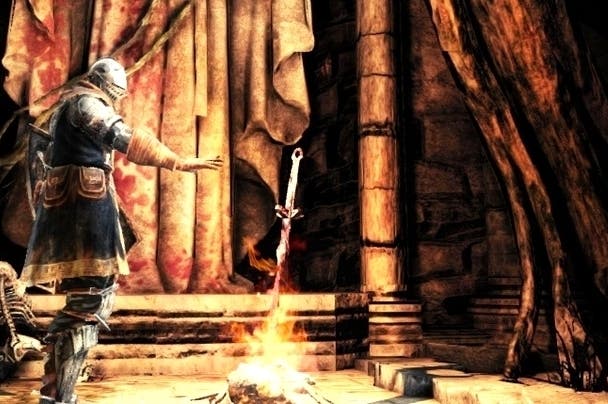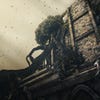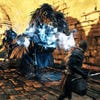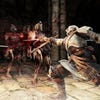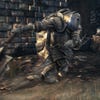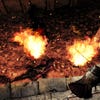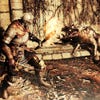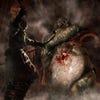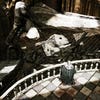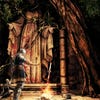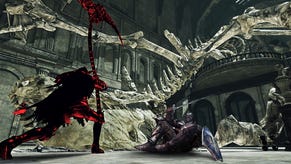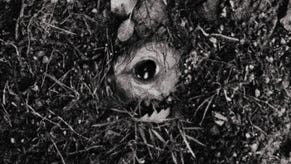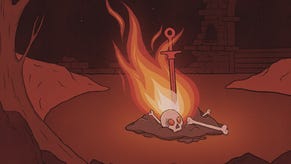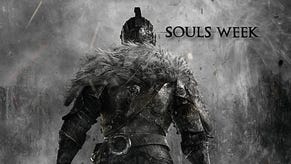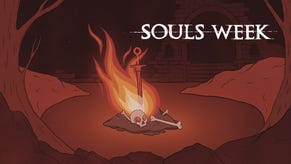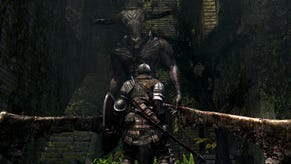"Enjoy your deaths": How there's nothing to fear in Dark Souls 2
After some initial trepidation, it turns out Dark Souls' new director knows exactly what makes the series tick.
"Enjoy your deaths."
Yui Tanimura, director of the upcoming Dark Souls sequel, says this a half dozen times from the stage. He's visibly nervous, grabbing at the sleeves of his tan jacket like a little kid wondering if his mittens are still tethered. Games journalists from all over the world have gathered in a New York City hotel ballroom to hear his timid words, echoing from the Canadian-accented translator. It probably wasn't helping his nerves to know that people like me were ready to brave an entire day's worth of demos just to hear what little tidbits he could reveal about Dark Souls 2 - a game that, until this very moment, had a trailer full of FMVs and literally nothing else. No release date, no gameplay shots, not even a subtitle like "The Squeakquel" or "Tournament Edition."
We're hanging on his every word during these opening remarks. And right now, those words are "enjoy your deaths".
He explains, between bouts of apologising for nerves, that Dark Souls 2 has to walk a fine line. The original, a dark, vaguely medieval RPG, is chastised for its difficulty. Specifically, the fact that you die a lot. Enemies are three times your size and other players, who have the ability to help by assisting with boss battles, mostly invade your world and kill you. There is little direction as to what happens when, and at least one boss that's just a pile of skeletons with a sickle sticking out of it. The downloadable content was christened, "Prepare To Die"; Dark Souls doesn't bury the lead. So in making the sequel, Tanimura - a new director to the franchise - wants to remove some of the brutality and really play up the sense of accomplishment you feel when overcoming a monstrous obstacle. Hence, he repeats, enjoying your death.
Those words don't sit well with me. I worship at the altar of Dark/Demon's Souls not because I enjoy dying so much, but because those games subvert the idea of death itself. Conventional wisdom of games dictates that in order to win, you don't die; those two titles spin death into an necessary part of the winning experience. It's no more or less important than, say, observing how an enemy moves, or timing a roll just right so you can backstab another player. It's the game's teaching tool just like everything else, a way to make mistakes and face them relatively consequence-free (except for losing your souls, the in-game currency, which isn't a huge deal once you slay bosses and get exponential amounts of them). Basically, death is essential to Dark Souls because it's sapped of almost all its power. I'd grown tired of people complaining that Dark Souls wasn't fair because you die all the time; to me, that's what makes it fair. You live and learn. Or, rather, you die and learn.
"In making the sequel, Tanimura - a new director to the franchise - wants to remove some of the brutality and really play up the sense of accomplishment you feel when overcoming a monstrous obstacle. Hence, he repeats, enjoying your death."
It's borderline mundane. To talk at length about it - hell, to anchor a presentation on its enjoyment - feels like misplaced emphasis. It reads as a desperate attempt by From Software to say, "Remember the hard part of Dark Souls? Well, it's not so hard anymore; it's fun! ENJOY IT." I'd found my own meaning in the deaths of Dark Souls. I worried that if death was front-and-centre in Dark Souls 2, this would sap the essential element of discovery and give objective meaning to a subjective game experience.
I've rarely been more happy to be wrong. Watching the Dark Souls 2 demo later in the day, it's clear Tanimura shares my sentiment about the game: death is a surrogate for experimentation, not an end, or beginning, unto itself. Even in the 10-or-so minutes I get to actually see the game in action, Tanimura has stripped Dark Souls down for parts, rebuilding it from scratch into the purest version of the learning curve I previously discovered on my own.
The first enemy we face is a solid silver turtle-like beast easily double the size of our main player - decked out in a fur coat that would make Rob Stark jealous. Once again we're deep in a dungeon, noticeably less dank thanks to a new graphical engine that's more Skyrim than Demon's Souls. Our guy rolls behind this overblown amphibian ready to strike. It slams its shell backwards onto us, and we die. The familiar death howl, like a supersonic jet flying just over your head, shakes the room and causes nervous chatter among the journalists. Tanimura shows off more deaths: a bridge collapsing as you cross it; a flaming chariot running you over in a narrow hallway; a pack of wild dogs picking you up and hoisting you over a cliff. By the time the nameless protagonist is batting away flying axes with his broadsword, misses and catches one through his skull, the room erupts with laughter. "YOU DIED," the screen reads.
"Core to Dark Souls is a sense of achievement - overcoming death in the game," Tanimura says in a brief interview after the demonstration. "We want to enhance that even further. Learning from mistakes is one thing. Another is simply adding variations to how you can die...[finding] new ways for players to suffer."
This raises the question of fairness, or the lack of it as I've heard people say of Dark Souls. I've often dismissed them as not getting it - to be "fair" implies keeping your character alive, a notion that should be foreign to Dark Souls and its sequel. My hipster pride made me stubborn.
Tanimura, once again, demonstrates his thoughtfulness on the topic. When I ask about his personal definition of fairness as it relates to Dark Souls, he leans forward. His face lights up. This is the first and only time all day I'll see even the briefest flash of confidence.
"Unfair, to me, is a plane crashing into you as you walk," he says. "Any time a player faces death in this game, I want to give it meaning. Whenever I direct a game, I ask myself what I have to pay attention to - how many hints do I need to evade these deaths?"
Dark Souls 2 walks that delicate line without venturing into territory non-fans might view as unfair. In one instance, you wander around an abandoned dragon-testing facility, surrounded by skeletons arranged Museum of Natural History-style. The head of one knocks you back at one point, but that's about it for enemies. There are long stretches of shadow and silence, and though you might be obsessively on the lookout - as Dark Souls games seem to inspire - there's nothing to fear, really. In fact, there's an empty spot on the wall that's just the right size for a square peg you've been carrying around, that lights every torch in the long hallway. Or, carry a torch with you - bonfires, where you recoup, are no longer the only places fire can be helpful. If you get mauled in a dark corner, it's partially your own fault now.
The game distills the act of making these choices, dictated by the person behind the controller. As before, you can play alone, or summon an array of warriors from the vast arsenal of online players - ported over to a dedicated server from Dark Souls' peer-to-peer system. There's also a non-linearity to Dark Souls 2: bosses are no longer relegated to separate rooms. That chariot from earlier is actually the big bad of the wherever, and can be taken down any time anti-chariot artillery is available (always). And though you still can't pause the game, you can take breaks from enemy infestations by entering those quiet chambers, loading up on weapons that might knock back those flying axes all the more handily.
When Dark Souls 2 was initially announced, there was fear that it would make too many concessions to the uninitiated, watering down its essence into an empty vessel of AAA-gaming commercialism. After spending a day around the corner from Times Square, where consumerism runs like green vomit after a Brooklyn St. Patrick's Day, it's clear Dark Souls 2 is taking a different tack. It's empowering fans to play how they want, enjoying deaths because they are wholly their own.
